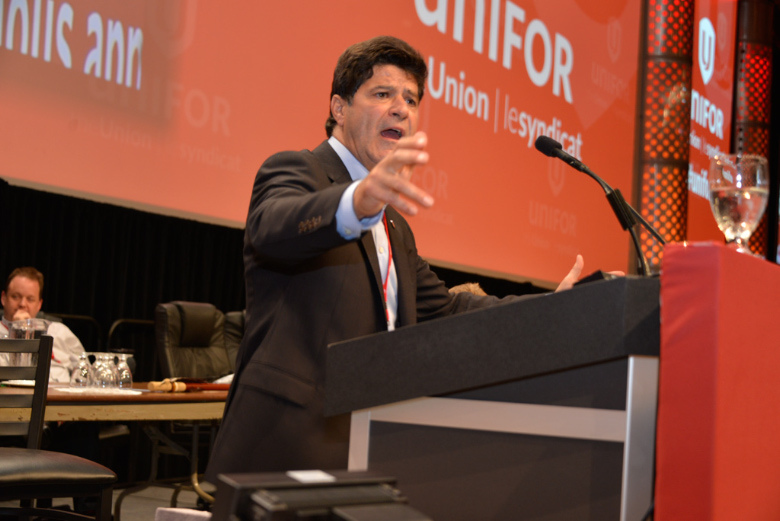
Jerry Dias, the new president of Unifor, speaks at the unios founding convention on Labour Day, 2013. (Photo: Unifor)
TORonTO The head of the unio representing Canadas auto workers is urging the federal and ontario governments to keep their remaining shares in General Motors instead of selling them off to investors.
Unifor national president Jerry Dias says he has sent a letter outlining his arguments to both federal Finance Minister Jim Flaherty and ontario Finance Minister Charles Sousa.
Ottawa and the ontario government disclosed earlier this week that they had sold a combined 30 million shares for a total of about $1.1 billion, based on a closing price of US$37 per share.
The two levels of government continue to hold a combined 110 million common shares in GM, acquired in 2009 in return for $10.6 billion in aid to the struggling automaker during the Great Recession. They also hold a combined 16.1 million series A preferred shares.
Dias says GMs shares will continue to appreciate in value as the North American auto industry regains sales volumes and profitability.
But more importantly, Dias says, maintaining a public equity stake in the company would help to ensure that GMs future manufacturing operations in Canada fairly reflect the contribution of Canadians to the companys turnaround.
RELATED: Federal, ontario governments sell part of their investment in GM
Selling the publics equity stake in this company now will deny Canadians an opportunity to share directly in that continuing progress, he wrote.
It is essential that we use every tool in the policy toolbox to ensure that GM and the other automakers in Canada retain and grow their operations here, he wrote. It is simply not enough for a jurisdiction like Canada to make itself competitive on cost grounds and then wait for global firms to beat a path to our door.
Dias noted that many countries around the world retain minority public ownership of automakers and other strategic firms.
This includes France, which owns 15 per cent of Renault, the German state of Lower Saxony which has 20 per cent of Volkswagen, and state development and sovereign wealth funds which own significant stakes in several other European and Asian automakers, he said.
Partial public ownership is one way to help ensure these companies remain loyal to the jurisdictions that made them profitable, he said.
It is no coincidence that Volkswagen has not closed a single assembly plant in Germany since the end of World War II.
Dias did not say what response, if any, he had received, However, it seemed unlikely to receive a positive reception given pledges by both levels of government to eventually get rid of all their GM holdings.
As we said from the start, our investment in GM was always meant to be temporary as we worked to maximize the return to Canadian taxpayers, Flaherty said in announcing this weeks sale, adding that Ottawa was committed to selling its remaining ownership of GM as quickly as feasible.
Sousa echoed that sentiment, saying the province was also committed to exiting from its remaining interest in the GM shares, while maximizing the value of the governments interest for the people of Ontario.




